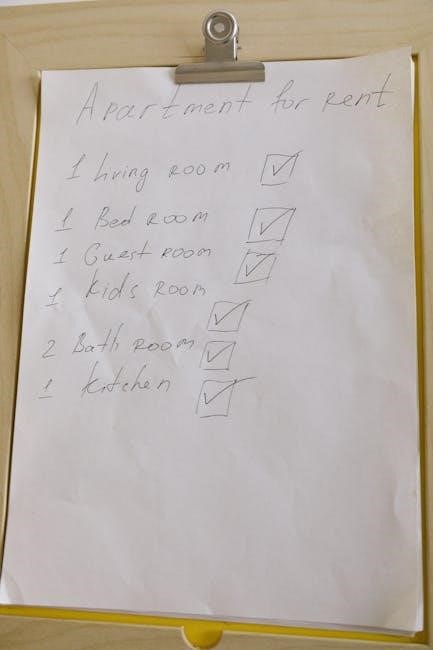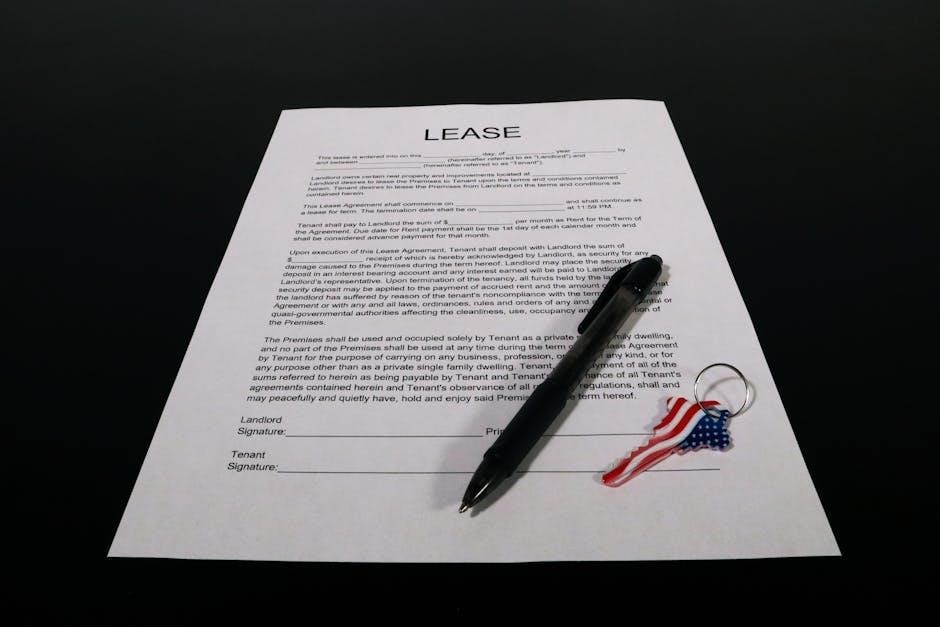A salon booth rental lease agreement is a formal contract between salon owners and stylists, outlining terms for booth usage. It ensures clarity on rent, duration, and responsibilities, providing legal protection and a structured framework for both parties.
1.1. Definition and Purpose
A salon booth rental lease agreement is a legally binding contract between a salon owner and a stylist, defining the terms for renting a booth. It outlines the rental period, fees, responsibilities, and expectations, ensuring clarity and mutual understanding. This document serves as a protective measure for both parties, preventing disputes and establishing a clear framework for the rental arrangement. Its purpose is to formalize the relationship, specifying the rights and obligations of both the salon owner and the lessee.
1.2. Importance of a Written Agreement
A written salon booth rental lease agreement is crucial for establishing clarity and legal protection for both salon owners and lessees. It prevents disputes by detailing financial terms, responsibilities, and expectations. This formal document ensures that all parties understand their obligations, reducing the risk of misunderstandings. A written agreement also provides a professional framework, protecting both parties’ interests and fostering a smooth operational relationship.

Key Provisions of a Salon Booth Rental Agreement
A salon booth rental agreement outlines essential terms such as rental duration, payment terms, and responsibilities of both parties. It ensures legal compliance and clarity.
2.1. Rental Period and Term
The rental period and term section specifies the duration of the agreement, whether it’s month-to-month, week-to-week, or a fixed term. It includes start and end dates, renewal options, and required notice for termination. This provision ensures clarity on the temporal aspects of the lease, preventing disputes and providing stability for both salon owners and lessees.
2.2. Rental Fees and Payment Terms
This section details the rental fees, payment schedules, and accepted payment methods. It specifies whether fees are fixed, monthly, or weekly, and outlines due dates. The agreement may also include late payment penalties and consequences for non-payment. Additionally, it clarifies what the rental fee covers, such as utilities, equipment, or shared amenities. This provision ensures transparency and mutual understanding of financial obligations, preventing potential disputes.
2.3. Responsibilities of the Salon Owner and Lessee
This section outlines the duties of both the salon owner and the lessee. The salon owner is typically responsible for maintaining the premises, ensuring equipment functionality, and providing necessary utilities. The lessee, often a stylist, must adhere to salon rules, maintain their booth, and comply with health and safety regulations. Both parties are expected to uphold professional standards and respect the terms of the agreement, fostering a collaborative and orderly work environment.

Benefits of Using a Salon Booth Rental Agreement
A salon booth rental agreement provides legal protection, clarity, and a structured framework for both salon owners and lessees, ensuring smooth operations and professionalism.
3.1. Legal Protection for Both Parties
A salon booth rental agreement offers legal protection by clearly defining the rights and responsibilities of both the salon owner and the lessee. It establishes a formal framework that outlines rental terms, payment schedules, and usage rights, reducing the risk of disputes. The agreement ensures that both parties are legally bound to adhere to the specified conditions, providing security and peace of mind. This legal safeguard is essential for maintaining a professional and mutually beneficial relationship.
3.2. Clarity in Rental Terms and Conditions
Clarity in rental terms and conditions is essential for avoiding misunderstandings. A well-drafted salon booth rental agreement outlines rental fees, payment schedules, and usage rights, ensuring both parties understand their obligations. It specifies the rental period, responsibilities for maintenance, and any restrictions on booth usage. This transparency creates a professional environment and ensures smooth operations, preventing disputes by providing a clear, mutually agreed-upon framework for the rental arrangement.

How to Create a Salon Booth Rental Agreement
Start with a template, ensuring all essential clauses like rental terms, payment details, and responsibilities are included. Customize to fit specific needs and ensure legal compliance.
4.1. Essential Elements to Include
Every salon booth rental agreement must include the rental period, payment terms, and responsibilities of both parties. Clearly outline the rental fees, due dates, and accepted payment methods. Specify the booth’s condition, equipment provided, and maintenance expectations. Define the lessee’s usage rights, operating hours, and client policies. Include clauses on insurance, liability, and termination conditions. Ensure compliance with local laws and regulations, and provide a section for signatures to finalize the agreement legally.
4.2. Customizing Templates for Specific Needs
Salon booth rental templates can be tailored to meet specific requirements. Users can add or remove form fields, upload booth images, and adjust fonts and colors for personalization. Lease agreements can be structured as month-to-month, week-to-week, or fixed-term rentals. Automated signing orders simplify processes for multiple renters. Free downloadable templates in PDF and Word formats allow for easy customization, ensuring all necessary details are included to protect both parties and maintain professionalism.

Important Considerations for Salon Booth Rentals
Key considerations include equipment maintenance, insurance coverage, and liability. These ensure smooth operations and protect both salon owners and stylists from potential risks and disputes.
5.1. Equipment and Facility Maintenance
Salon booth rental agreements should outline responsibilities for equipment and facility upkeep. The salon owner typically maintains shared spaces and major equipment, while the lessee handles their booth’s condition. Regular maintenance ensures functionality and safety, with clear guidelines for repairs and replacements. Both parties must adhere to health and sanitation standards, and the agreement should specify who is responsible for damages or upgrades. This ensures a well-maintained environment for both stylists and clients, preventing disputes and fostering a professional atmosphere.
5.2. Insurance and Liability Coverage
A salon booth rental lease agreement must address insurance and liability coverage to protect both parties. The lessee should maintain insurance for their equipment and liability, while the salon owner insures the premises. The agreement should clarify who is responsible for damages or incidents, ensuring both parties are covered. Clear terms prevent disputes and provide financial protection in case of accidents or property damage, safeguarding both the salon and the stylist’s interests effectively.

Salon Booth Rental Agreement Templates
Salon booth rental agreement templates are available as free downloadable PDFs or editable Word documents, offering customizable solutions for formalizing rental terms and conditions efficiently.
6.1. Free Downloadable PDF Templates
Free downloadable PDF templates for salon booth rental agreements offer a convenient and cost-effective solution. These templates provide pre-designed structures with fillable fields, allowing users to input specific details like rental terms, payment schedules, and booth descriptions. Many templates are customizable, enabling salon owners to tailor agreements to their unique needs while ensuring legal compliance. They often include sections for signatures, dates, and witnesses, making them ready for immediate use. Popular platforms provide these templates, catering to both salon owners and independent stylists seeking professional agreements.
6.2. editable Word Doc Templates
6.2. Editable Word Doc Templates
Editable Word Doc templates for salon booth rental agreements provide flexibility and customization. Users can modify clauses, add or remove sections, and tailor the agreement to specific needs. These templates often include drag-and-drop form fields, allowing easy input of rental terms, payment details, and booth descriptions. They support features like automated signing and can be adjusted to fit branding or legal requirements. While versatile, it’s essential to ensure all edits comply with local laws and regulations. These templates are ideal for salons seeking a professional, adaptable agreement solution.

State-Specific Laws and Regulations
State-specific laws regulate salon booth rentals, requiring compliance with local business and health codes. These laws may dictate lease terms, tax obligations, and operational standards, ensuring legal compliance.
7.1. Compliance with Local Business Laws
Salon booth rental agreements must adhere to state and local business laws, ensuring proper licensing and zoning compliance. These laws often dictate operational standards, health codes, and tax obligations.
Failure to comply can result in legal penalties, making it crucial for both salon owners and lessees to understand and follow all applicable regulations. This ensures a legally sound and operational business environment.
7.2. Tax Implications for Salon Booth Rentals
Salon booth rentals involve specific tax obligations for both salon owners and lessees. Owners must report rental income, while lessees may deduct expenses like booth fees and supplies. Sales tax on services and potential property taxes also apply. Compliance with local tax laws is essential to avoid penalties. Consulting a tax professional ensures accurate filings and maximizes deductions, benefiting both parties financially.

Software Tools for Managing Salon Booth Rentals
Software tools streamline salon booth rental management with digital signing, payment processing, and scheduling systems, enhancing efficiency and organization for both owners and lessees.
8.1. Digital Signing and Management Platforms
Digital signing and management platforms simplify the process of creating, signing, and storing salon booth rental agreements. Tools like PDFfiller and DocuSign allow for secure electronic signatures, automated workflows, and cloud-based document storage. These platforms enable salon owners and stylists to easily manage multiple agreements, track expiration dates, and access documents remotely. They also provide real-time notifications and collaboration features, ensuring seamless communication and compliance with lease terms. This modern approach enhances efficiency and reduces paperwork in managing salon booth rentals.
8.2. Automated Payment and Scheduling Systems
Automated payment and scheduling systems streamline salon booth rental management by enabling timely rent payments and appointment scheduling. These tools allow salon owners to set up recurring payments, send reminders, and track payment statuses. Integrated calendars help manage booth availability, reducing conflicts. Automation ensures consistency, minimizes late payments, and enhances overall operational efficiency, benefiting both salon owners and renters by maintaining a smooth and organized rental process.
A salon booth rental lease agreement is essential for protecting both parties’ interests, ensuring clear terms, and organizing responsibilities. It provides legal security and operational efficiency, making it a vital tool for salon owners and stylists alike.
9.1. Final Thoughts on Salon Booth Rental Agreements
A well-crafted salon booth rental lease agreement is crucial for ensuring smooth operations and protecting both parties’ interests. It provides clarity on rental terms, responsibilities, and expectations, minimizing disputes. By outlining payment terms, lease duration, and maintenance obligations, it fosters a professional relationship. Salon owners and stylists should prioritize customization to meet specific needs, ensuring compliance with local laws. Investing time in drafting or reviewing the agreement is essential for long-term success and peace of mind in the business.
9.2. Encouragement to Use Legal Documentation
Using a salon booth rental lease agreement is vital for protecting both salon owners and stylists. It ensures clarity, prevents disputes, and provides a professional framework for the relationship. Legal documentation safeguards rights, outlines responsibilities, and maintains clear communication. With customizable templates available, creating an agreement is straightforward and accessible. Prioritizing legal documentation fosters trust and stability, allowing both parties to focus on growing their business successfully.
